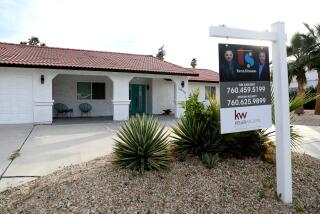The Smart Way to Buy Foreclosures
If you’re like most savvy investors, the thought of the sinking housing market has raised the question of whether now is the perfect time to buy, and if so, are foreclosures the best option?
The answer is yes, they can be, but you’d better understand the various steps and phases of foreclosures before you sink your cash into a foreclosed property.
‘We’re kind of emphasizing buying foreclosures that are bank-owned, or through the bank, because a lot of the creative financing, easy financing techniques that people used to use to buy pre-foreclosures just aren’t there. So [buyers] kind of end up in the same position as the people who currently own the house in that [they] can’t get financing or can’t afford the financing that’s out there,’ says Bobbi Dempsey, co-author of ‘The Complete Idiot’s Guide to Buying Foreclosures’ (Alpha).
You can buy a distressed property when it’s in one of the following phases:
• Pre-foreclosure the homeowner still has control of the property.
• Auction sale you may be bidding against lenders.
• Real estate-owned (REO) a lender-owned property.
• Government-owned potentially a slower process with more paperwork.
Regardless of which phase you are attempting to purchase the property, how do you begin the process? There is a growing selection of foreclosed homes to choose from across the country, as today’s faltering housing market yields hundreds of thousands of these properties. . But maybe you’ve heard that buying foreclosures can be a long and risky process. It can be, especially if you don’t know the laws regarding foreclosures. Here’s a step-by-step guide to help acquaint you with the process.
Finding foreclosures
You don’t have to be a private investigator or born under a lucky star to find a foreclosure home. These days, they can be found in low-, middle- and high-income neighborhoods -- no socio-economic level is immune.
Drive through neighborhoods and see foreclosure signs posted. So, too, are signs from hopeful investors who are vying for an opportunity to acquire a pre-foreclosure property at a good price from an anxious homeowner.
But that’s not the only way to find foreclosures. Building a network of contacts from traditional lending institutions, mortgage banks, real estate agents and residents living in areas where you hope to invest can lead to an ideal purchase.
Traditional lenders have lists of REO properties that are being sold by the bank. Contact lenders and get on their mailing list. Very often real estate agents work with banks to handle the REO properties. Befriending a savvy, experienced agent who specializes in REOs can help you learn about a foreclosure first.
Don’t rule out what can sometimes be the best place to search for foreclosures: the newspaper and Internet. Nearly all buyers start their search online. Homeowners, banks and real estate agents often post foreclosed properties for sale in both print and online. According to Dempsey, foreclosure sale ads from the U.S. Department of Veterans Affairs (VA) and the Federal Housing Administration (FHA) are posted in the newspaper on a regular schedule; her book advises readers to contact the classified manager at the paper for the schedule. Legal notices of default also run in newspapers.
Also, remember to check online public records, foreclosure listing services and perhaps the best source: the county courthouse. This is where all real estate transactions for a property in that county are recorded.
Pre-Foreclosure: Buying Directly From the Homeowner
You can make an offer to purchase a property when it’s in pre-foreclosure, when the lender agrees with the homeowner to accept less than the outstanding balance of a mortgage loan and avoid foreclosure. This usually translates into a discount for the buyer below the home’s market value.
This type of purchase, also known as a short sale, was recently all the rage. Investors sought out homeowners who were delinquent on their loans and attempted to negotiate a deal to bail them out of their financial debt by purchasing their home. Some buyers knocked on doors, made phone calls, sent e-mails or letters to distressed homeowners. However, Dempsey says letters aren’t as effective as they used to be. ‘A lot of those letters were from predatory lenders or people who were just out to scam them. I think that nowadays the homeowners tend to throw all that stuff away and ignore it more than they used to.’ Keep in mind that when the property enters pre-foreclosure, which is somewhat of a grace period, the owner has several months (up to six months in some states) to pay off the default amount.
Auction: Get Ready to Bid
Auctions are typically conducted by a neutral third party such as a trustee or sheriff. And while buying a property at an auction can offer some high profits, it does have its drawbacks too.
‘You’re taking it as is and if you buy it at an auction, you usually can’t even go in the house and see it,’ cautions Dempsey.
These types of purchases can offer a lesson in frustration, seeing that auctions are frequently cancelled or postponed last minute. It’s also important to note that during this phase the lender cannot take advantage of the property owner in any way. Nor can the lender make a profit at the auction. When the property is sold to the highest bidder, the liens are paid and any overage is given to the homeowner -- though typically, once the loans are paid, there is no money left for the homeowner.
One caveat: When you buy a property at an auction, be sure you have investigated the ‘right of redemption’ law, which means homeowners can reclaim their property within a certain period of time if they pay all past-due amounts and applicable fees for the property. This time period varies from state to state.
Buying REO
REO, or real estate owned (by the lender), is the most popular method of buying a foreclosure, because it’s generally the easiest and safest way. However, when you purchase a lender-owned property, it can offer the least value and most competition. Understand that the lender acquired the distressed property at the auction, because no one bid higher than the default amount. Now that the lender owns the property, it can be sold for any price, even for a profit.
Government-owned properties
Buying foreclosures that are owned, maintained, and/or sold by the government can amount to more paper work and a potentially slower process.
‘In the past, I’ve heard that some of the agencies move kind of slowly, and they don’t seem to have as much incentive to cut the price or grab a buyer. They seem to be willing to wait it out and wait for somebody who wants to pay what they want for the property,’ says Dempsey.
Buying properties from the FHA, VA, Small Business Administration, Fannie Mae, Freddie Mac, IRS or others can save you money. Some of these agencies may assist with financing, but the IRS will not--you’ll have to pay full cash for the property.
Buying foreclosures can be a cost-saving and rewarding experience, but before you dive in, do your research and use the best experts in the field.






